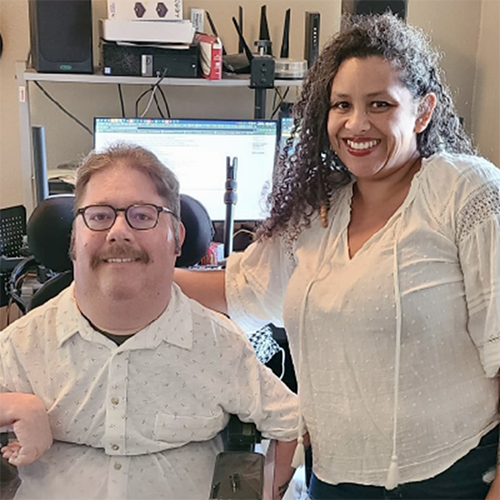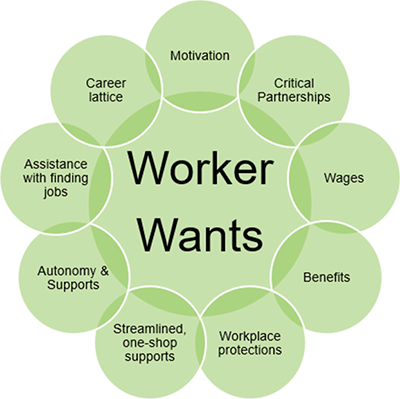
Every day across the nation, Direct Support Professionals (DSPs) play a vital role in America’s workforce and economy by providing necessary supports and services to people with disabilities of all ages, including supports related to employment.
DSPs are part of the broader workforce of Direct Care Workers (DCWs). A 2019 issue brief estimates 4.5 million people in the U.S. are DCWs, 87% of whom are women and 53% women of color.
As skilled professionals, DSPs support people with disabilities to participate in their communities, including through employment. For example, they may serve as job development staff to assist in finding and/or customizing jobs or as job coaches who provide direct employee assistance on the job. They also provide other services, such as help with activities of daily living.
A current nationwide shortage of DCWs, including DSPs, adversely affects not only millions of DSP workers themselves, but also the many people who use or could benefit from their services. Shortages in recent years have spurred federal, state and local action to bring more attention to this profession and mount an effective response to attract more people to become DSPs and support them through appropriate compensation and opportunities for advancement. People with disabilities can be great candidates as DSPs to help address the shortage.

Historically, DSPs primarily served as caregivers for the people they supported. In the past few decades, however, the needs of those served began to change, and the roles of DSPs began to change as well. Today, the role of a DSP goes beyond caregiving and focuses more broadly on supporting people with disabilities to participate fully in their communities, live in integrated settings and seek competitive integrated employment (CIE). Some of the roles of a DSP include:

To better understand effective strategies for supporting and expanding the DSP workforce, ODEP, through the LEAD Center, hosted a DSP “Think Tank” on February 3, 2022. More than 80 individuals, including DSP advocates and experts, participated. The following day, 18 government agencies participated in a listening session summarizing ideas gleaned from the event to help them better understand the important role DSPs play in supporting the employment of people with disabilities and the consequences of the DSP workforce shortage.
The event covered four main topics:
Direct Support Professionals (DSP) Think Tank Recommendations — This executive summary compiles strategies recommended by experts in response to the challenges discussed during the Think Tank. It also includes a report about current policies, programs, practices, proposals and activities related to women in the direct care workforce.
Adding Value Through Direct Care Work — This blog, written by DSP Aleathea Simmons, a woman with a disability, provides insight on the job duties of a DSP. Ms. Simmons reflects on her experiences to illustrate the importance of direct care work in enabling people with disabilities to live and work in their communities and the potential policy solutions that could expand and improve the profession.
Direct Support Professional Careers for People with Disabilities – In this LEAD Center webinar, RCM of Washington Chief Executive Officer Amy Brooks and Chief Innovation Officer Susan Brooks share how RCM’s DSP Academy creates opportunities for people with disabilities to work as DSPs using customized employment and reasonable accommodations. This webinar features testimonials of DSPs with disabilities and why they find DSP work rewarding.
In 2010, DOL’s Employment and Training Administration (ETA) approved national guidelines for apprenticeship standards for DSPs. These standards enable employers to use ETA's Registered Apprenticeship program to train DSPs in the health care industry’s long-term care sector.
Outside of apprenticeships, job training for DSPs varies widely depending on the position, provider and location. Some employers provide training and/or require certifications. Agencies that manage consumer-directed services, such as in-home support services, may also offer and/or require certain types of skills trainings. Some people with disabilities train their DSPs directly, and several organizations offer their own certification and training programs.
Note: Some of the trainings do have costs attached with them. ODEP does not administer or otherwise have oversight over these organizations or their training programs.
Administration for Community Living (ACL) – Part of the U.S. Department of Health and Human Services, ACL’s was created around the fundamental principle is that older adults and people of all ages with disabilities should be able to live where they choose, with the people they choose and with the ability to participate fully in their communities. ACL funds a wide range of programs that are managed by states and communities to best meet the needs of people who live there. ACL will establish a national center to expand and strengthen the direct care workforce across the country. The Direct Care Workforce Capacity Building Center will support the recruitment, retention and professional development of workers who provide home and community based services.
Institute on Community Integration (ICI) – An area of focus for ICI is to ensure that public policy and services are helping people with disabilities live their best lives in inclusive communities. Through applied research, policy advocacy and training, ICI engages with individuals with disabilities, families, providers, policymakers and community members to influence local, state and federal policies, and support individuals with disabilities and their families across their lifespans.
National Alliance on Direct Support Professionals (NADSP) – The mission of NADSP is to elevate the status of DSPs by improving practice standards, promoting system reform and advancing their knowledge, skills and values. The various services and programs offered by NADSP provide professional development opportunities along with the resulting recognition and acknowledgement that these professionals deserve.